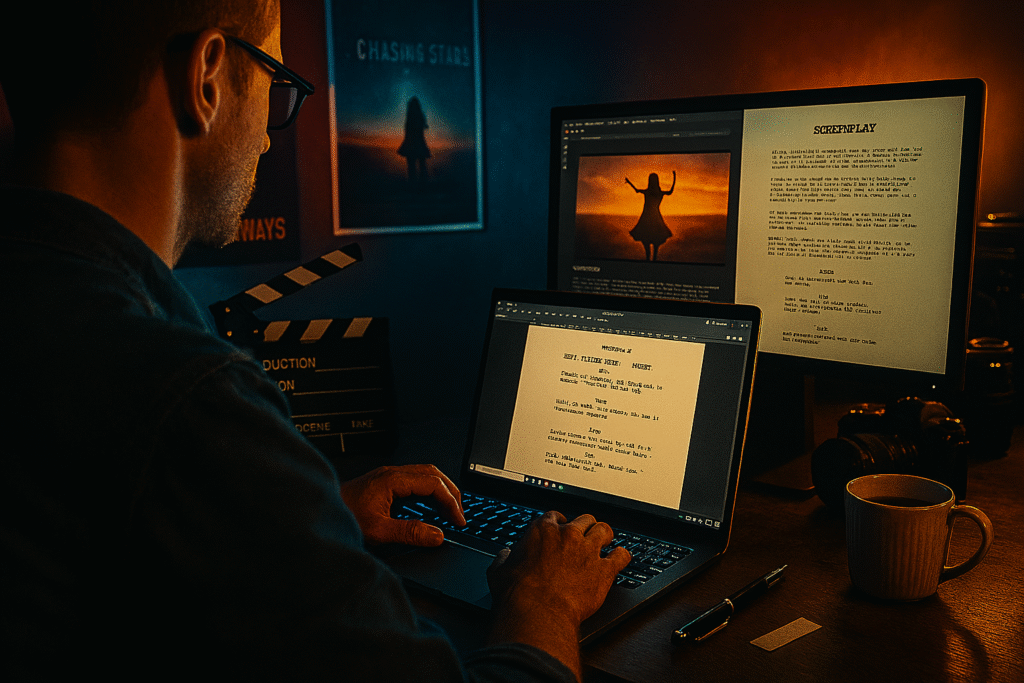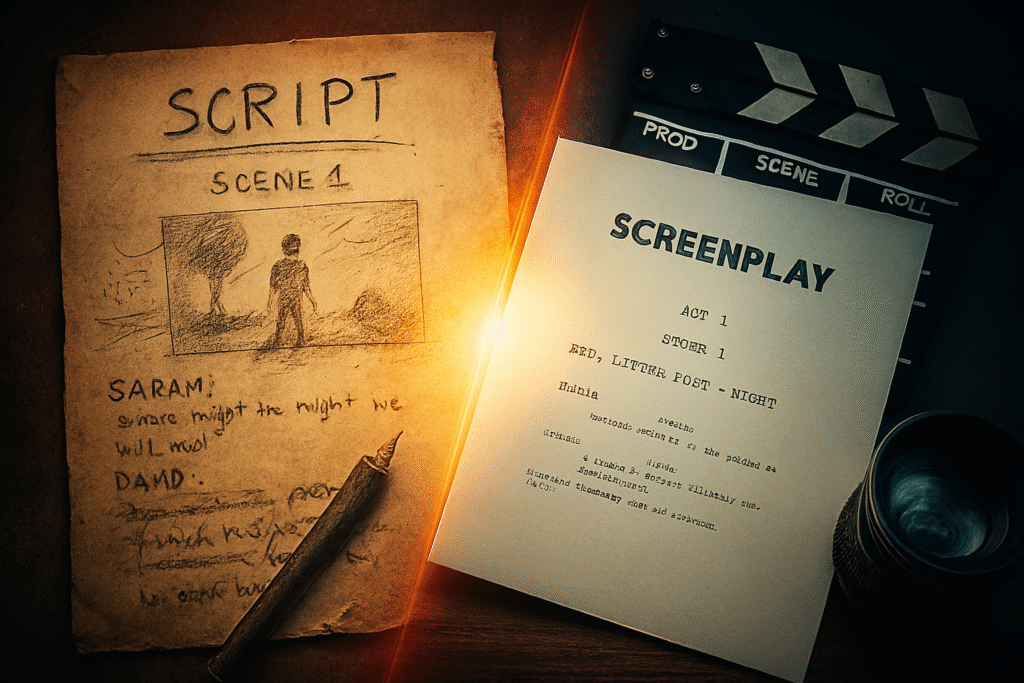In filmmaking, people often mix up the words “screenplay” and “script.” This can confuse new writers and filmmakers. Knowing the difference is important if you want to tell stories through movies.
Understanding the Basics
What Is a Screenplay?
A screenplay is a detailed document used for movies, TV shows, and web series. It works like a blueprint for the whole production. Screenplays include:
- Dialogue: What characters say.
- Scene Headings: The location and time of day.
- Action Lines: What characters do.
- Camera Directions / Shots: Instructions for the camera.
- Transitions: How one scene moves to the next.
This helps everyone, from actors to directors, understand the story clearly.

What Is a Script?
A script is a written story that can be for plays, video games, speeches, or books. It mainly focuses on dialogue and basic actions. Scripts don’t include detailed technical instructions for filming.
Key Differences
| Feature | Screenplay | Script |
|---|---|---|
| Medium | Movies, TV, web series | Theater, games, speeches, books |
| Detail Level | High – includes technical and visual instructions | Moderate – focuses on dialogue and story |
| Format | Strict | Flexible |
| Purpose | Guides the production | Provides the story structure |
| Usage | Pre-production tool | Used in many storytelling forms |
Real-Life Example
Imagine watching a TV show scene. The actors speak, the camera moves, and the lighting sets the mood. A screenplay plans all these details. A script only has the dialogue and basic actions.
Personal Experience
I once wrote a script for a short film. The dialogue was good, but the team had trouble understanding my vision. After turning it into a screenplay with clear scene headings and camera directions, filming went much smoother.

Strengths
Screenplay:
- Guides the whole production team.
- Shows the director’s vision clearly.
- Helps with budgeting and scheduling.
Script:
- Works for many types of stories.
- Gives freedom in interpretation.
- Easier to write without technical rules.
Areas to Improve
Screenplay:
- Hard to learn formatting.
- Needs knowledge of cameras and lighting.
Script:
- Lacks filming instructions.
- Can be misinterpreted during production.
Comparison Table
| Aspect | Screenplay | Script |
|---|---|---|
| Purpose | Detailed guide for visual media production | Foundation for storytelling across mediums |
| Content | Dialogue, action lines, camera directions, transitions | Dialogue, basic actions |
| Formatting | Strict and standardized | Flexible |
| Usage | Pre-production tool for filmmakers | Used in various storytelling mediums |
| Detail Level | High – includes technical and visual instructions | Moderate – focuses on dialogue and narrative |
FAQ Section
- Can a script become a screenplay? Yes, a script can be developed into a screenplay by adding detailed descriptions, camera directions, and technical instructions required for visual media production.
- Do all films use screenplays? While most films use screenplays, some independent or experimental films may use scripts or other forms of written material.
- Is screenwriting a specialized skill? Yes, screenwriting requires knowledge of formatting, visual storytelling, and technical aspects of film production.
- Can a script be used for a TV show? Yes, scripts are commonly used for TV shows, especially during the early stages of development.
- Are there different types of screenplays? Yes, there are various types, including spec scripts (written to sell), shooting scripts (used during production), and teleplays (written for television).
Conclusion
Understanding the difference between a screenplay and a script is essential for anyone involved in the filmmaking process. While a script provides the foundational story, a screenplay offers the detailed blueprint necessary for bringing that story to life on screen. By mastering both, you can ensure your vision is accurately translated into the final production.
Ready to take your business to the next level? LinkLuminous can help you attract more clients, increase sales, and strengthen your online presence. With the right strategies, your business can grow smarter and faster.
Author Bio
Jane Doe is an experienced screenwriter and filmmaker with over 10 years in the industry. She has worked on various film and television projects, specializing in script development and screenplay writing.
References
- Merriam-Webster Dictionary
- Cambridge English Dictionary
- Studiobinder Blog
- Indeed Career Advice
- Squibler Learning Center


